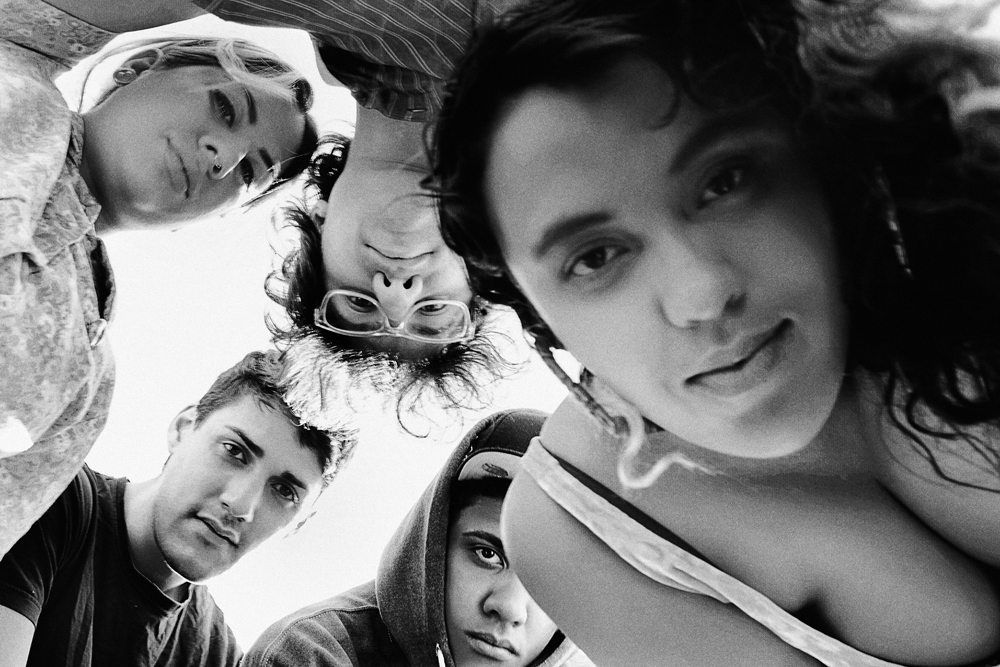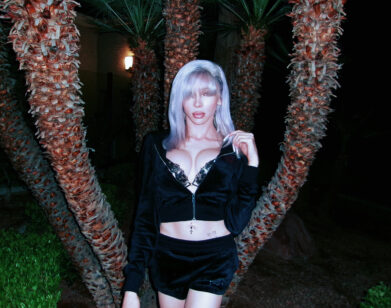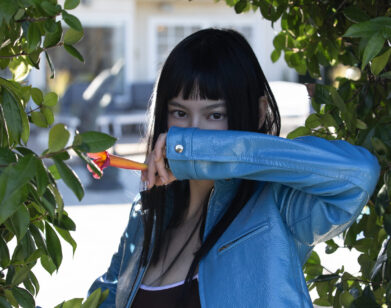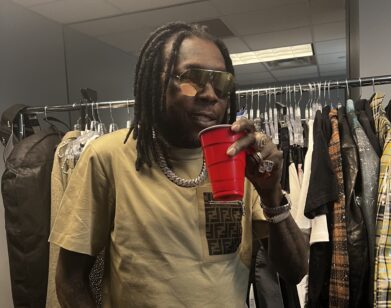Downtown Boys
DOWNTOWN BOYS IN BROOKLYN, JUNE 2017. PHOTOS: DEAN PODMORE. GROOMING: MICHAEL CHUA USING CAUDALIE AND REDKEN.
Two years ago, Downtown Boys, the Providence, R.I.-based punk band, catapulted themselves out of their local scene and onto the national stage with their infectious, politically riled-up sophomore album, Full Communism. On their new one, Cost of Living, out today via Sub Pop, the five-piece returns with a sharpened sound courtesy of the producer and former Fugazi member Guy Picciotto. Full of fleet-footed vocals from frontwoman Victoria Ruiz, who sings in both English and Spanish over a blaring saxophone, the 12 electrifying songs fiercely challenge the oppressive power dynamics of our age, from fascism to capitalism.
Earlier this summer, Interview reached Ruiz and vocalist and guitarist Joey La Neve DeFrancesco by phone, to discuss the new album and why the band isn’t calling for a revolution just yet.
MATT MULLEN: Let’s start with Cost of Living, which is amazing. How did the album begin, and how did it come together?
JOEY LA NEVE DEFRANCESCO: The first songs started being written after we recorded Full Communism in 2015, so they were mostly written pre-election. I just know that’s a narrative some people want to tell, which is fine. Of course the context is all there. Regardless, the songs started immediately getting written after the last record and accelerated probably toward the end of last year, so while we were getting into the election season and Trump was gaining traction. I think the songs all came about in different ways. It’s not necessarily one consistent format that’s coming out. Some of them were worked on more in advance, some were coming from a lyric idea that Victoria had, and then we would kind of work to structure a song around that. Our bass player Mary [Regalado] wrote one of the songs.
MULLEN: I can see why people want to draw connections between your music and what’s happening politically, because your last album spoke so explicitly to that. Do you feel pigeonholed into that narrative?
VICTORIA RUIZ: Yeah. People are like, “Oh, this is timely,” or it feels like protest music that perhaps is a rebuttal to the fascist dictator that has been elected president, but that’s not our issue, or our only issue. It’s because I think so many people right now—especially white people—are slowly waking up to all of these things that people have been talking about, and writing about, and singing about, and acting upon for hundreds of years. So the idea that we’re so timely is really speaking to where people are at politically right now, not us. We grew out of a DIY and punk scene where having people of color in the band, having femme people in the band, and speaking to these things very directly felt refreshing, because maybe it hadn’t been happening as much as it had in the past or it somehow felt that we were carving out a new space. Now so many musicians are doing that. In many ways, it’s no longer that new or that interesting to be doing protest music or to be making music that directly hits at the status quo. So we’ve been revving up the engine in terms of what we talk about and the things that we hit; we can go a little bit deeper, and get a little bit more nuanced. I think this new batch of songs … If you’ve never heard Downtown Boys before it might not be apparent, like it used to be, that we’re super anti-police or really anti-capitalist, because these songs have these nuances.
DEFRANCESCO: It’s just like when we put out the last record. We were getting the same questions and the same phrases being used, because “It Can’t Wait” came out during these big waves of Black Lives Matter protests. But if you’re aging with the world and know what’s going on and making art, it’s going to pertain to your time. If you are not doing that then it’s sort of like, well, what are you doing?
MULLEN: What is your relationship to anger and how do you channel it in your music?
RUIZ: It’s hard to answer on behalf of the band because honestly, we are all so different and we are all coming from pretty different personal experiences. But I think when the band confronts anger, we are confronting a very collective anger that has to do with white supremacy and toxic masculinity creating standards about how we are supposed to walk in the world, how we are supposed to be in the world. We’re often called a punk band, but actually a lot of our influences and a lot of our supporters have really pushed us in different directions as artists and as people. We have to deal with all of these different limits and borders that you constantly have to walk on both sides of, and think about, and realizing how easy it is for people to be divided just based on fear, and based on this desire to feel like you belong to something. I think this album is looking at that. There is a song, “Promissory Note”, with the line: “I won’t light myself on fire to keep you warm.” That has to do with the idea that, as artists, we are often put into some type of box, and if we don’t fit that box perfectly then we’re thrown away. I think that our anger is driving us to rethink what it means to have a seat at any table of power and to realize that perhaps we don’t want a seat at a table where we’re going to have to be perfect or we’re going to have to be silent.
MULLEN: What was it like working with Fugazi guitarist Guy Picciotto?
DEFRANCESCO: We were in awe that it was able to happen, because he’s such a legend and musical hero for a lot of us. He really believed in what we were doing, and gave us the confidence to pull it off. I mean, certainly he contributed concrete ideas, but I feel that his presence was like a stamp of approval when we had an idea we weren’t sure about.
RUIZ: He also has an extreme technical ability; he would literally be like, “At second 13 or at second 22 I hear a bend in the music.” And we’d be like, “Oh my God, this is why you have a producer.” It was cool to hear all of these stories about Fugazi because in literally every music community Fugazi is held up on a pedestal, so to see how they were also just humans trying to make it happen … There were stories of things breaking down, or eating a burrito before a set, just the humility of it all. We watched the Fugazi mystique crumble away. It really took our minds off of the stress.
MULLEN: Post-album, post-Trump, are you are distracted by what’s going on in the world, or has it been more of a motivating force?
DEFRANCESCO: I wish my answer could be that you see this awful stuff happening around the world and you get inspired to go fix it up, but obviously that is not always how it works. We’re in the studio, a closed-off space, scrolling through our phone for hours looking at all the terrible stuff and feeling helpless, like, “What am I going to do?” Anger can be motivating, but also it can create this anxiety and hopelessness. You want to hide. And it can be hard to move it into action. I think that anyone doing any kind of political work or cultural work knows in their heart that when they see this stuff, you need to go out harder than you’ve ever gone, and try to push yourself in that way. We don’t have a lot of other options right now.
MULLEN: What about you, Victoria?
RUIZ: I definitely think that the president has affected me and my ability to participate in the world. And in many ways it doesn’t necessarily have to do with him—it has to do with everyone around me. The people I’m really close to who have been fighting for racial justice for so long, for worker justice for so long, to know that they are going to see these very direct setbacks is terrifying. I work for the Center for Popular Democracy in addition to the band, and it’s just crazy. As someone who participates in media and helps to make a lot of media—i.e. music—the stakes feel a lot higher now. Our shows maybe five years ago felt more like a rally or like a really crazy beast being unleashed in the room, and now there are so many moments where it’s like a quiet, fierce resilience—especially from people of color. I think our shows are a moment of decompression. A moment of catharsis. I don’t think we are trying to push some rally call right now, because the people that actually care about us probably need a moment of catharsis instead.
COST OF LIVING (SUB POP) IS OUT TODAY, AUGUST 11, 2017. FOR MORE ON DOWNTOWN BOYS, VISIT THE BAND’S FACEBOOK.







